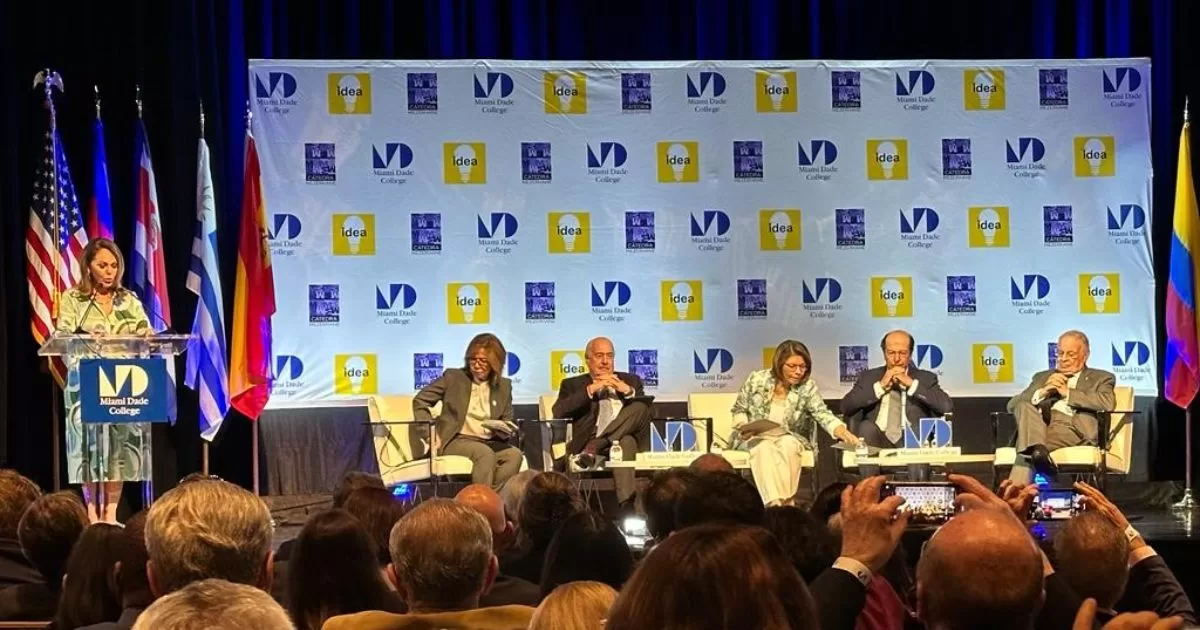The online event, in which former presidents José María Aznar (Spain), Miguel Ángel Rodríguez (Costa Rica) and Osvaldo Hurtado (Ecuador), as well as 12 professors, will participate, will take place from July 1 to 3, 2024, from 9:30 am to 11:30 am (ET).
First session
The former president of the Spanish government José María Aznar will be the main guest in the first session scheduled for July 1, who will give the opening remarks, along with Madeline Pumariega, president of Miami Dade College (MDC). This first segment will be moderated by Romina Cavalli, vice-rector of USAL, Buenos Aires.
The topics and participants of this session are: The origins of LawFare and political polarization, by Asdrúbal Aguiar, general secretary of the IDEA Group and program director at MDC; and The judicial government: Guarantee or deviation from democracy?, by Jesús M. Casal, dean of the Faculty of Law of the UCAB, Venezuela.
Likewise, Disinformation strategies in the cases of Catalonia and the conflict in the Middle East, with words by José Rosiñol Lorenzo, former president of Catalan Civil Society; and The systematic criminalization of politics and the press in Venezuela, by Miguel Ángel Martínez Meucci, from the CEDICE Academic Committee.
Intermediate session
The second session of the seminar, scheduled for July 2, will have the former president of Costa Rica Miguel Ángel Rodríguez as a special guest, and the moderator will be Amelia Vicini, vice president of the BARNA Council in Santo Domingo.
The topics and participants of this session are: Constituents and constitutional ruptures in Latin America: The experiences of Chile and El Salvador, by Alberto Dalla Vía, director of the Master’s Degree in Judiciary, University of Buenos Aires (UBA).
Additionally, The re-elections of rulers and alternation in democracy, by Fortunato González Cruz, Academia de Mérida; Judicial control of digital governance in the 21st century, which will have as a speaker Miguel Ángel Martín T., former president of the TSJ of Venezuela in exile; and Digital networks and political representation, by Mariana Gómez del Campo, president of ODCA.
Closing of the seminar
The third session of the academic event will take place on July 3. The former president of Ecuador Osvaldo Hurtado will be the main guest, moderated by Pamela Fuertes, dean of Global Studies at the MDC.
The topics and participants of this session are: Transnational organized crime and its presence in the State: Cases in Ibero-America, with the presentation of Juan Carlos Apitz, dean of the Faculty of Law of the UCJV; and Judicial coups d’état: Cases from the United States and Latin America, by Martín Oyanoharte, Universidad del Salvador (USAL), Buenos Aires.
Also, Global Agendas without the Rule of Law (Puebla, Davos, UN-2030, Russia/China), by Sebastián Grumberger, director of the Regional Program Political Parties and Democracy in Latin America (KAS); and Profiles of the Rule of Law in Latin America for the 21st century, with a presentation by Diego Valadés, president of the Ibero-American Institute of Constitutional Law.
The closing remarks will be given by Mr. Enrique García Aguilar y Ordúña, director of the Royal Spanish-American Academy of Sciences, Arts and Letters of Spain, Cádiz. To register for the seminar you can click here. If you are interested in watching the broadcast via Zoom, access this link.
“The judicial lie”
Aguiar, director of the IDEA Group, explained to DIARIO LAS AMERICAS that for nine years the “Presidential Dialogue” has been held, based at Miami Dade College and with the participation of more than 30 former presidents of Ibero-America, in order to evaluate the standards of compliance with democracy in the Americas.
From these meetings, he said, these seminars emerged four years ago “aimed at young people and potential leaders so that they can be educated and trained on issues that have to do with global governance and growth in freedom.”
In the fourth edition of the Virtual Seminar on Digital Governance and Growth in Freedom, according to Aguiar, “the central issue has been debated in these nine years of presidential dialogues, which is the judicialization of politics.”
Regarding this, the professor emphasized what he called “judicial lying as a physiology for the exercise of power,” which is observed in the authoritarian regimes installed in countries in the region.
“For us this is a key issue,” he remarked, “because, ultimately, where justice is lacking, democracy completely gives way.”
In Aguiar’s opinion, “when the administration of justice loses the ability to control the powers of government, the guarantees of freedom simply end.”

